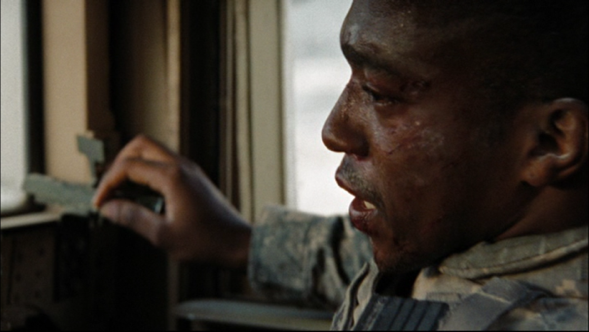"A Different Kind of War Film: The Ethos of the Individual Soldier in The Hurt Locker"
|
Mikal LambdinMikal has a BA in English with a concentration in Writing and Rhetoric from George Mason University. She most recently worked as an Undergraduate Research Assistant for Writing Across the Curriculum, where she wrote research-driven blog posts about composition from a student perspective. She enjoys pushing the envelope when writing by creating her own rhetorical frames and finding connections between dissimilar topics like children’s literature and politics. Mikal lives in Arlington, Virginia, with her doctor-to-be husband and hyperactive cat. Contents"I Don't Know": Leaving Things Out "I Don't Know": Leaving Things Out Cont. "I Wanna Die Comfortable": War is a Game "I Wanna Die Comfortable": War is a Game Cont. "With Me I Think It's One": Man Over Machine |
"I Don't Know": Leaving Things Out Cont.Anonymity is used most pointedly in the final scene before James’s rotation ends and he returns home. After a gut-wrenching encounter with a suicide-bomb victim, during which both James and Sanborn are injured and almost killed, the two soldiers engage in a solemn conversation about the reality they face: SANBORN. I'm not ready to die, James. JAMES. Well, you're not gonna die out here, bro. SANBORN. Another two inches. Shrapnel zings by, slices my throat. I bleed out like a pig in the sand. Nobody'll give a shit. I mean my parents, they care, but they don't count, man. Who else? I don't even have a son. JAMES. Well, you're gonna have plenty of time for that, amigo. SANBORN. Nah, man. JAMES. You know? SANBORN. I'm done. I want a son. I want a little boy, Will. I mean, how do you do it, you know? Take the risk. JAMES. I don't know. I just… I guess I don't think about it. SANBORN. Every time we go out, it’s life or death. You roll the dice. You recognize that don't you? JAMES. Yeah. Yeah. Yeah, I do. But I don't know why, you know. I don't know, JT. You know why I'm the way I am? SANBORN. No, I don't.  Shaken by the events that have just taken place, Sanborn exhibits sincere vulnerability and openness, and he looks for the same from James. This grave and touching scene seems to be a turning point in the film, readying James to finally open up and reveal the pain, fear, and weakness that he must be feeling underneath his calm exterior. Instead, the exterior remains firmly in place, a shield that hides everything beneath it. As Sanborn reveals his fears and regrets, James takes a proverbial step back, refusing to engage with this sudden openness. He disregards Sanborn’s fear of death and desire for a son, assuring him that these are nonissues, with an added “bro” and “amigo” to confirm his nonchalance. James is visibly uncomfortable with his fellow soldier’s outpouring of emotion, as he looks away and pretends that these dire concerns are not concerns at all. When Sanborn finally asks the critical question – “how do you do it?” – James responds the same way he has been responding since the beginning: “I don’t know.” The best answer he can come up with is, “I guess I don’t think about it,” and the audience is left to decide whether or not this is true. Is James completely unaware of himself? Is this awareness buried deep down, as he ignores the parts of his identity that are hard to understand or difficult to accept? Does he even care to know what drives him? Similar to the scene previously analyzed, James ends the conversation by turning the attention away from himself and asking someone else for an answer: “I don’t know, J.T. Do you know why I’m the way I am?” The question, like so many before it, goes unanswered.  This moment is striking in that James is directly asked to reveal himself – his thoughts, his fears, his secrets – anything and everything is on the table. The scene is perfectly crafted to disclose James’s anonymity, to finally yield him an open book, like so many film clichés before him. When he refuses to comply, it is as if the treat being dangled in front of the audience’s noses is suddenly yanked away, and it becomes clear that this scene is meant to serve a different purpose. If James’s ethos as an ordinary individual was not established before, it is now. This final, pointed anonymity is decisive proof of his normality. Even when it would be so easy to give in to film norms by building up to a thrilling moment of reveal, James’s character remains consistently elusive and unromantic. |